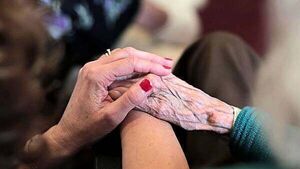Better understanding of palliative care south of the Border, survey finds

By Gráinne Ní Aodha, PA
The understanding of palliative care in the Republic and the North is ahead of other countries, according to a new study.
But the knowledge about end-of-life care was better south of the Border compared to the North, the survey indicated.
A study carried out by Queen’s University Belfast on behalf of the All Ireland Institute of Hospice and Palliative Care (AIIHPC) aimed to measure “death literacy” across the island of Ireland.
The research clearly shows that not everyone is aware of the benefits of accessing palliative care services and supports in their communities or making decisions about their own future care and that of those close to them. This is why our awareness campaign is so important each year
Death literacy is defined as the “knowledge and skills that people need to make it possible to gain access to, understand, and make informed choices about end-of-life and death care options”.
Between November 2024 and March 2025, over 400 people across the island took part in an online survey on services and supports for death, dying, and bereavement.
The results of the survey indicate that the island of Ireland surpasses other countries in its knowledge about end-of-life care options, but that gaps remain in local communities about the services available.
The survey gave a score of 68.1 per cent to those on the island of Ireland, which compares to 47.6 per cent in the UK, 51.5 per cent in Belgium, 57.2 per cent in the Netherlands, and 61.2 per cent in Australia.
The study also indicated that knowledge in the Republic (75.8 per cent) is ahead of Northern Ireland (67.5 per cent).
The area of “support in my community” received the lowest score of 60.4%, with people lacking in knowledge about the services and supports for individuals with serious progressive illnesses, those nearing the end of their lives, people caring for a dying person, and those grieving.
The survey also found that nearly one in three people (27.7 per cent) overestimated their knowledge, and also that the vast majority of people (83.7 per cent) expressed a desire to improve their knowledge.
Chief executive of AIIHPC Karen Charnley said: “The research clearly shows that not everyone is aware of the benefits of accessing palliative care services and supports in their communities or making decisions about their own future care and that of those close to them.
“This is why our awareness campaign is so important each year.
“It’s also why we highlight the lived experience and personal stories of those who have accessed palliative care and the variety of events taking place throughout the island during the week – a marked increase on previous years, with over 100 events planned.

“But really the first step is one we can all take – simply speaking to our GPs and other health care providers to help us become better informed and close the knowledge gap, particularly around what services and supports are available in our local areas now and for our future needs.”
Stephanie Crawford, researcher at Queen’s University Belfast, said the study offers “crucial insights” into death literacy across the island of Ireland.
“By identifying specific knowledge gaps, particularly around community support, we hope this research will enable a more precise and effective targeting of palliative care services, ultimately benefiting more individuals and families.”
Irish premier Micheal Martin said that access to “vital services at critical times is a fundamental right”.
“We must bridge the knowledge gap, ensuring every individual is aware of and can readily access the support and care they need, when they need it most,” the Taoiseach said.
“This is about empowering our communities and ensuring no one is left behind.”
The Northern Executive’s Health Minister Mike Nesbitt said: “By raising awareness about palliative care and empowering individuals to make informed choices, we can ensure more people can access the vital support they need in their communities.”
Dr Feargal Twomey, a palliative medicine consultant and National Clinical Lead for Palliative Care, encouraged all citizens and healthcare workers to speak about death and dying.
“Though this study reports high levels of ‘death literacy’ in Ireland, there is no guarantee that this necessarily translates to each person with a serious illness receiving the palliative care that they need.
“For many of the public and the staff working in our healthcare services, the term ‘palliative care’ is often only associated with death and dying, and not also with enabling people to live as well as they can for as long as possible.
“I encourage the public and all healthcare professionals to ask, talk and speak up about palliative care so that our patients and their families can receive the right palliative care, in the right place, and at the right time, as soon as they need it.”
The publication of the research coincides with Palliative Care Week 2025, which runs from September 7th-13th.
This year’s campaign, Living for Today, Planning for Tomorrow, highlights how palliative care helps people with life-limiting illnesses to live to the best of their abilities.




